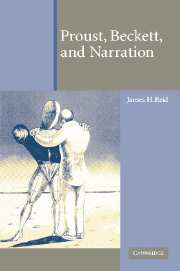Book contents
- Frontmatter
- Contents
- List of abbreviations
- Introduction
- 1 Remembering forgetting: Le Drame du coucher
- 2 Impressions, the instant of artistic consciousness, and social history
- 3 Lying, irony, and power: Proust's deceptive allegories
- 4 Proust's forgetful ironies
- 5 Molloy's Way: The parody of allegory
- 6 Moran's Way: The forgetful spiral of irony
- 7 Malone Dies and the impossibility of not saying I
- 8 The Unnamable: The death of the ironical self and the return of history
- Notes
- Bibliography
- Index
8 - The Unnamable: The death of the ironical self and the return of history
Published online by Cambridge University Press: 22 September 2009
- Frontmatter
- Contents
- List of abbreviations
- Introduction
- 1 Remembering forgetting: Le Drame du coucher
- 2 Impressions, the instant of artistic consciousness, and social history
- 3 Lying, irony, and power: Proust's deceptive allegories
- 4 Proust's forgetful ironies
- 5 Molloy's Way: The parody of allegory
- 6 Moran's Way: The forgetful spiral of irony
- 7 Malone Dies and the impossibility of not saying I
- 8 The Unnamable: The death of the ironical self and the return of history
- Notes
- Bibliography
- Index
Summary
I have argued throughout this book that the first-person narrators in Beckett's trilogy, like Proust's narrator in the Recherche, dramatize an interplay between irreconcilable modes of constructing the first-person narrator's discourse: allegory and irony. The Recherche backgrounds this interplay by foregrounding the story of Marcel's search to disclose remembered, personal selves, which becomes an allegory of deconstructing this search. Beckett's trilogy also seems to background this interplay, but by subordinating the notion of self to the impersonal, rhetorical interplay between the structures of allegory and irony. The trilogy thus appears to mark a literary historical transition from Proust's seemingly allegorical narrator to Beckett's ironical narrators.
I have endeavored to show, however, that the trilogy's irony also undercuts this historical distinction by marking itself as a literary historical repetition of the same formal interplay of language between allegory and irony that is already found in Proust. In Proust, as in Beckett, language alone, not a narrator's personal voice, would ironically and impersonally produce and demystify the alternate illusions that are spoken by an allegorical or ironical voice. But the trilogy also puts into question this transhistorical repetition of language's impersonal non-voice by disclosing how the category of voice exceeds language's formal allegorical and ironical rules. This disclosure foregrounds a transition from language's seemingly impersonal, ironical production of allegorical and ironical voices to an allegory of the search for personal and literary historical difference.
- Type
- Chapter
- Information
- Proust, Beckett, and Narration , pp. 138 - 155Publisher: Cambridge University PressPrint publication year: 2003



